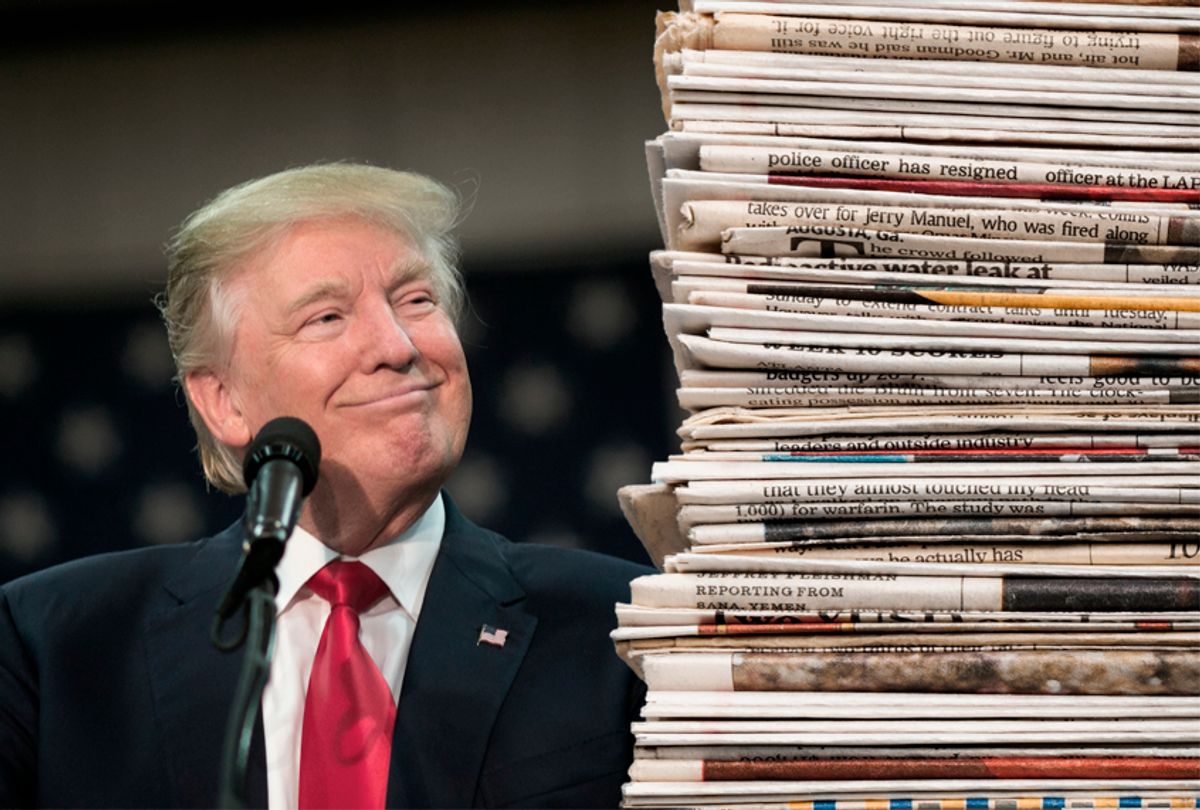President Donald Trump’s “enemy of the people” rhetoric is putting the lives of American journalists at risk, Mother Jones’ Mark Follman reported Thursday, citing comments from law enforcement leaders and top security officials at two major news outlets.
Trump’s years of vicious invective — echoed by his allies at Fox — are bearing fruit. Reporters are facing a surge in bomb and death threats, organized harassment, online publication of their personal information (“doxxing”), and threatening mail sent to their home addresses, Follman’s sources warn. One security director at a major television news network told Follman that the threats spike when Trump rails against the network by name, with the harassers often using Trump’s “fake news” language, and that they are primarily aimed at journalists who report on the White House and the Trump-Russia probe — the very targets of the president’s ire.
This heightened fear of violence against reporters will certainly continue throughout Trump’s tenure as president. There’s no indication that he will ever stop demonizing journalists — this is a deliberate strategy to discredit them for political gain that he has continued employing even after a man was arrested for threatening to murder reporters while using Trump’s anti-press rhetoric. But there’s reason to fear that even after Trump is no longer president — especially if he wins re-election in 2020 — his party will continue down the same path. Naked, vicious hostility to the press could become a central plank of the Republican Party, turning elevated concerns about potential violence into the new normal.
Trump’s ascension to the Republican presidential nominee was opposed by a broad cross-section of the party’s establishment. But since he became president, that opposition has almost entirely dissipated.
Trump is now the unchallenged leader of his party, with overwhelming approval ratings among the party base. That support makes him a Republican political kingmaker, with the candidates he supports dominating the primary field this year. Meanwhile, candidates are betting that the best way to win their primaries is to mimic the president’s behavior and publicly pledge their loyalty to him. They are donning his caps and adopting his catchphrases. They parrot his authoritarian calls to imprison his political opponents, his racist demagoguery and his attacks on the press.
That process will only accelerate over the next few years as more skeptical establishment Republicans retire, lose primary challenges, or succumb to Democrats, while Trumpist candidates win Republican primaries and ascend the party hierarchy. The longer Trump remains in power, the stronger his grip will be on the future of the Republican Party, as generations of party leaders gain power because of their fidelity to the president and their willingness to ape his conduct.
That Trumpening of the Republican Party has implications for partisan politics writ large, not least with regard to the way Republicans treat journalists. Conservatives have for decades been trying to work the refs by smearing the media with the “liberal bias” canard. Trump’s campaign builds on that foundation, but his invective is different in tenor, type, and frequency — a constant drumbeat tarring journalists with Stalinist “enemy of the people” invective. Polling shows that the president’s attacks have warped the Republican base, with a majority now agreeing with that charge.
The base is following the president, and other Republican politicians are following the base. Trump’s staunchest congressional allies and candidates who hope to join them respond to critical coverage by wielding his talking points against the press. Those criticisms are becoming ever more central to their political campaigns: Rep. Devin Nunes (R-CA), a leading Trump confederate, released a two-minute ad this summertargeting his district’s leading newspaper as a “fake news” outlet that “work[s] closely with radical left-wing groups.”
Even Republicans who were once harshly critical of Trump, like his former primary opponent, Sen. Marco Rubio (R-FL), have seen which way the wind is blowing and responded in kind. “Many Republicans won’t criticize Trump even when they don’t agree with him b/c it means siding with a media that nevers cuts him a break,turns even little things he does into an act of evil,are also unfair to them & in the end will still attack you anyway,” he tweeted in June.
The party leaders most willing to call out the president’s rhetoric are on their way out of power. Sen. Jeff Flake (R-AZ) took to the Senate floor earlier this year to decry his "assault" on the media as "unprecedented" and "unwarranted." But that was months after he announced that he would resign at the end of his term, a tacit acknowledgement that his willingness to criticize Trump made it impossible to win his party’s nomination in the current era.
The future of the Republican Party is echoing Trump’s attacks on the press. Only members of its past are willing to speak out against that strategy. And if his party continues to succeed, it will show them that fixating on journalists as the “enemy of the people” is a viable path forward.




Shares